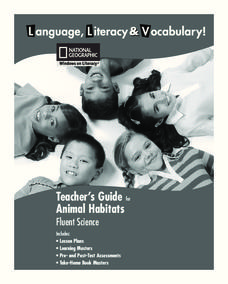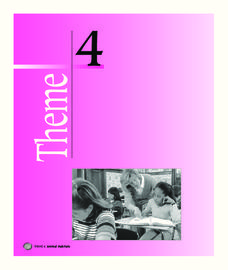Aquarium of the Pacific
Ocean Habitats
Watch what happens in an underwater wonderland! Pupils view a video about two specific ocean habitats and complete a worksheet by placing the fish species into the correct habitat. They then take a deeper look into the ocean habitats by...
Lerner Publishing
Teaching Habitats
What makes up a habitat? Use this resource to engage first graders in the exploration of desert, wetland, forest, and ocean habitats. Youngsters classify plants and animals into the four distinct habitats through drawings and cutting and...
Curated OER
Ocean Habitats
Students examine the water samples from a demonstration and discuss the difference between fresh and salt water. They draw different animals that live near or in the ocean and how humans can harm the ocean habitat. They draw pictures of...
Project WET Foundation
Discover Our Ocean
A very informative interactive presents ocean zones, estuaries, hot water vents, phytoplankton, coral reefs, sea turtles, kelp forests, and all things that thrive in the ocean.
Curated OER
Mixed Media Ocean Art
Students design pictures of ocean environments. In this art lesson, students use mixed media art materials to develop a picture that depicts the ocean environment. They use paint, sand paper and various basic art materials.
Howard Hughes Medical Institute
Ocean Acidification
Human impacts on the environment can sometimes be difficult to measure, especially under water! An activity centered on ocean acidification gives science scholars the opportunity to examine the effects of carbon dioxide on marine life....
PreKinders
Ocean Word Cards
Dive into ocean vocabulary with a set of 29 picture word cards. Each card presents a picture of an animal or item from the ocean in vivid color, as well as its name.
Houghton Mifflin Harcourt
Animal Habitats: Extra Support Lessons (Theme 4)
The activities and exercises in this packet, the third in the series of support materials for the Houghton Mifflin Harcourt thematic units on animal habitats, are designed for learners who need extra support with the basic concepts of...
NOAA
A Day in the Life of an Ocean Explorer
What's life like aboard an ocean exploration vessel? Junior oceanographers examine the important role of communication in ocean research in lesson two of a five-part series from NOAA. The materials introduce the class to life on board...
American Museum of Natural History
Ocean Creature Feature
From coloring to hard protective shells, ocean creatures have adaptation features that help them survive. An eight-question online quiz highlights different ocean animals and their unique characteristics. The resource then offers pop-up...
Curated OER
Animal Habitats
Elementary schoolers complete a learning exercise that has them decide which of four environments a variety of animals live in. The environments are: pond, soil, ocean, and woodland. There are 12 different types of animals that pupils...
National Geographic
Animal Habitats
Explore animal habitats and reinforce speaking, listening, reading comprehension, and writing skills with a unit that focuses on the Arctic, desert, ocean, prairie, and rainforest. Enthusiastic scientists read informational text to...
NOAA
Build Your Own Ocean Ecosystem
Hold the sea in the palm of your hand! Amateur oceanographers work together to create models of an ocean ecosystem in the sixth and final installment in a series. Raise awareness of global ocean health issues through guided research,...
Houghton Mifflin Harcourt
Animal Habitats: English Language Development Lessons (Theme 4)
This activities in this packet, the second in the series of support materials for the Houghton Mifflin Harcourt thematic units on animal habitats, are designed specifically for English language learners.
Curated OER
Oceanic Habitat Zones
Students explore ocean habitats. In this oceanic environment instructional activity, students research various habitats in the ocean. Then, in a jigsaw format, students teach others in the class about the habitat they researched.
Curated OER
Habitats
Photographs of different habitats ask viewers to consider who would live in each. Desert, polar, rain forest, freshwater, and ocean habitats are depicted. Each is followed by a slide with pictures and color graphics of the inhabitants....
Curated OER
Entering the Twilight Zone
Students describe major features of cold-seep communities and the process of chemosynthesis as it relates to organisms in each habitat. In this deep-sea habitats lesson plan, students study the categorization of ocean habitats according...
University of Waikato
Ocean Acidification and Eggshells
Eggshells and seashells have a lot in common. Learners use the similarities to conduct an experiment that models the effect of ocean acidification on marine animals. Using varying levels of acidic liquids, pupils make observations on the...
Curated OER
A House for Me- Ocean Environments
Learners explore ocean environments. For this ocean environment lesson, students identify the things ocean animals need for survival. Learners use KWL charts and search the Internet collecting information about ocean habitats. Students...
Curated OER
The Chesapeake Bay in Captain John Smith's Time
When Captain John Smith visited the Chesapeake Bay in the summer of 1608, what types of animals and habitats did he encounter? Your young historians will analyze primary source documents to answer this question, as well as compare the...
Ocean Parent Letter
Send this letter home to parents on Thursday before unit begins on Monday. For next time, encourage participation by noting low tide times on weekends and evenings. For non-beach communities, include links to VR tours or other access to...
NOAA
Deep-Sea Ecosystems – Entering the Twilight Zone
Imagine an ecosystem without any light or oxygen, where living things convert carbon dioxide into food. This ecosystem is thriving and might just be the largest ecosystem on our planet, yet we know very little about it. The lesson...
Rainforest Alliance
Protecting the Critical Habitat of the Manatee and Loggerhead Turtle
Explore ocean habitats with a lesson plan that showcases the home of manatees and loggerhead turtles in Belize. Here, pupils compare and contrast the homes of ocean animals to those of humans, listen to an original short story about the...
National Park Service
Weather Patterns of the Pacific Ocean
How do oceans affect weather patterns? Learners define vocabulary associated with dew point, topographical lifting, condensation, and formation of clouds and precipitation as they explore the weather in the Pacific Northwest. They also...
Other popular searches
- Deep Ocean Habitats
- Deep Ocean Habitats
- Ocean Habitats Year 2
- Science Ocean Habitats
- Ocean Habitats Math
- Ocean Habitats Producers
- Ocean Habitats Inquiry Based
- Ocean Habitats Inquiry
- Ocean Habitats Language Arts
- Powerpoint Ocean Habitats

























